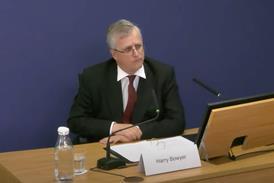A litigant banned from bringing civil proceedings has been barred from representing others as a McKenzie friend.
Lord Justice Bean said Dr Vaidya (no additional name is included in the judgment) had 'habitually and persistently' brought civil proceedings without proper grounds and it was right to make him subject to a restrictive section 42 order.
The order, sought by the attorney general, prevents from instituting or making applications in the civil courts and tribunals without leave of the court.
But the applicant went further in seeking also to prevent Vaidya from acting as a McKenzie for anyone else in the courts or tribunals. In what is believed to be one of the first examples of such an extention, Bean agreed to widen the order.
'When an order is made under section 42 against a vexatious litigant it should be standard practice to include a paragraph prohibiting the vexatious litigant from acting as a representative or McKenzie Friend,' said the judge. 'If a litigant is to be prevented without leave of the court from bringing cases himself, the case must surely be even stronger to prevent him from appearing as a representative.'
Vaidya had argued that such an order would impede others' access to justice, although he had not acted as a McKenzie friend for at least two years.
In Attorney General v Vaidya, the court heard details of 14 cases in which the doctor had been a party, followed by four cases in which he had acted on behalf of others. In the vast majority, an application brought by him had been described as totally without merit.
Vaidya argued he had been successful in some litigation, but Bean said the question was whether the failed claims were made on reasonable grounds.
'The section 42 jurisdiction is not a question of a batting average,' he added. The judge said the section 42 process was established as 'Human Rights Act compatible' and it was in the court's discretion to make the order.



















![David Lester (senior partner at Blythe Liggins), Darryl Barnes, Jagdeep Sandher (head of dispute resolution at Blythe Liggins)[4]](https://d1d8vslyhr7rdg.cloudfront.net/Pictures/274x183/4/2/8/116428_davidlesterseniorpartneratblytheligginsdarrylbarnesjagdeepsandherheadofdisputeresolutionatblytheliggins4_981603_crop.jpg)




4 Readers' comments